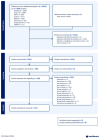Challenges and Opportunities of Universal Health Coverage in Africa: A Scoping Review
- PMID: 39857539
- PMCID: PMC11764768
- DOI: 10.3390/ijerph22010086
Challenges and Opportunities of Universal Health Coverage in Africa: A Scoping Review
Abstract
Background: Universal health coverage (UHC) is a global priority, with the goal of ensuring that everyone has access to high-quality healthcare without suffering financial hardship. In Africa, most governments have prioritized UHC over the last two decades. Despite this, the transition to UHC in Africa is seen to be sluggish, with certain countries facing inertia. This study sought to examine the progress of UHC-focused health reform implementation in Africa, investigating the approaches utilized, the challenges faced, and potential solutions.
Method: Using the Preferred Reporting Items for Systematic Reviews and Meta-Analyses Extension for Scoping Reviews guidelines, we scoped the literature to map out the evidence on UHC adoption, roll out, implementation, challenges, and opportunities in the African countries. Literature searches of the Cochrane database of systematic reviews, PUBMED, EBSCO, Eldis, SCOPUS, CINHAL, TRIP, and Google Scholar were conducted in 2023. Using predefined inclusion criteria, we focused on UHC adoption, rollout, implementation, and challenges and opportunities in African countries. Primary qualitative, quantitative, and mixed-methods evidence was included, as well as original analyses of secondary data. We employed thematic analysis to synthesize the evidence.
Results: We found 9633 documents published between May 2005 and December 2023, of which 167 papers were included for analysis. A significant portion of UHC implementation in Africa has focused on establishing social health protection schemes, while others have focused on strengthening primary healthcare systems, and a few have taken integrated approaches. While progress has been made in some areas, considerable obstacles still exist. Financial constraints and supply-side challenges, such as a shortage of healthcare workers, limited infrastructure, and insufficient medical supplies, remain significant barriers to UHC implementation throughout Africa. Some of the promising solutions include boosting public funding for healthcare systems, strengthening public health systems, ensuring equity and inclusion in access to healthcare services, and strengthening governance and community engagement mechanisms.
Conclusion: Successful UHC implementation in Africa will require a multifaceted approach. This includes strengthening public health systems in addition to the health insurance schemes and exploring innovative financing mechanisms. Additionally, addressing the challenges of the informal sector, inequity in healthcare access, and ensuring political commitment and community engagement will be crucial in achieving sustainable and comprehensive healthcare coverage for all African citizens.
Keywords: Africa; health insurance schemes; health systems; primary health care; social health protection schemes; universal health coverage.
Conflict of interest statement
The authors declare no conflicts of interest.
Figures
References
-
- World Health Organization . Declaration of Alma-Ata. World Health Organization (Regional Office for Europe); Copenhagen, Denmark: 1978.
-
- African Union . Africa Health Strategy (2016–2030) African Union; Addis Ababa, Ethiopia: 2016.
-
- UN General Assembly Transforming Our World: The 2030 Agenda for Sustainable Development. [(accessed on 22 October 2023)]. Available online: https://www.refworld.org/docid/57b6e3e44.html.
-
- Adewole D.A., Osungbade K.O. Nigeria National Health Insurance Scheme: A highly subsidized health care program for a privileged few. Int. J. Trop. Dis. Health. 2016;19:1–11. doi: 10.9734/IJTDH/2016/27680. - DOI
Publication types
MeSH terms
LinkOut - more resources
Full Text Sources




